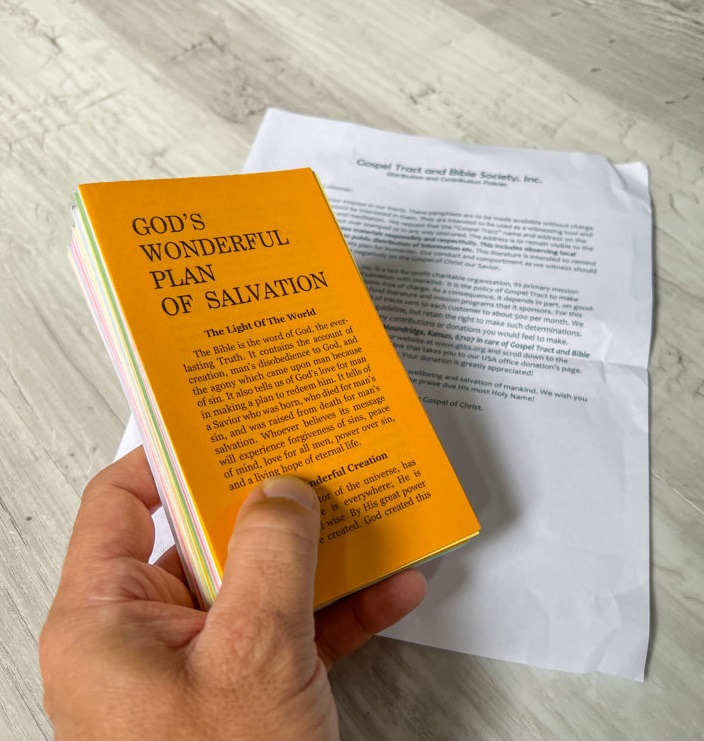by Donald A.G. Burling

I have been asked whether tracts are still necessary in today’s world. I answer, why not? They may be unfashionable, but so is preaching the Gospel. St. Paul urges Timothy to preach the word, to be urgent in season and out of season. Preaching does not have to be verbal. Tract distribution is the easiest form of evangelism, and is particularly useful for the inexperienced. Tracts can also be used in conjunction with other activities such as singing, open-air preaching or door to door visitation. A well-written tract can give people the Gospel in compact form, which they can take away and reflect on.
Their weakness is that too often they are treated as junk mail and not read. It is all the more important to catch the readers’ attention with the title and first sentence.
I have dabbled in this over many years, though only one of my tracts was ever taken up by a publisher – the rest were home made. A trustee of a publishing house once remarked to me how difficult it was to write a good tract. Most of mine were for special occasions – the approach to Christmas being the most potentially fruitful. When I was a volunteer driver I had a leaflet to give to my passengers. I produced a number of two line slips to leave in trains, with messages such as “SIN NOW – Pay later. Who’s afraid of Hell”; “How do I know that God exists? Have you tried asking Him?”; “I have never done anything to need God’s forgiveness. Congratulations – you are the first one.”
Why evangelise anyway? There are three good reasons. The first is our Lord’s commission, stated in three of the Gospels, to go and make disciples of all nations. I admire the Jehovah’s Witnesses for their commitment to spreading their version of the Gospel; but I would hesitate to put this as a burden on all Christians. The second is – is it no concern to us that many of the people around us, our neighbours and acquaintances, are on their way to hell? The third is to try to resist the decline in church attendance and membership that has been occurring over the last century or more.
How well do you understand the Gospel? Can you express the way of salvation in a few words? Too much reliance on one scripture, such as John 3 v 16, can leave people confused. Study the Gospels and the Epistles, particularly Romans and James.
We cannot deny that we live in a secular age. Few people have any knowledge of the Bible, and most have an aversion to religion. Yet all have a conscience, though they may try to suppress it. A few – perhaps more than we realise – may be genuinely seeking for spiritual realities.
Things to be avoided include long-windedness – the more words, the less they are likely to be read. Avoid churchy language – at best it will come across as old-fashioned, at worst as unintelligible. Don’t insult your readers – be careful with words like ‘sinner’. On the other hand, don’t be evasive when mentioning repentance, hell and damnation. Beware of making statements that cannot be substantiated, such as that a Christian’s life is always a happy one.
Most news reporters will summarise their stories in a few words at the beginning of their report, then continue with a longer explanation – often in smaller type. Advertising feature writers are likely to start with something irrelevant but interesting before getting round to their main subject. Either approach can be used in tracts; the latter is particularly effective if you have a gripping true story, such as that of the atheist tiler in Bradford who found himself sliding down a roof on a ladder, and was heard to cry out “Our Father which art in Heaven”. The danger is that people will stop reading when they come to the religious bit.